Key takeaways:
- Seasonal allergies are triggered by the immune system mistakenly identifying harmless pollen as a threat, resulting in symptoms that can disrupt daily life.
- Common allergens include pollen, mold spores, and ragweed, which can vary seasonally and significantly impact those sensitive to them.
- Effective management strategies include monitoring pollen forecasts, maintaining clean indoor environments, and using proactive allergy medications.
- Using audio news aggregators allows for convenient access to relevant health information, helping individuals stay informed about allergy forecasts and personal experiences in the community.
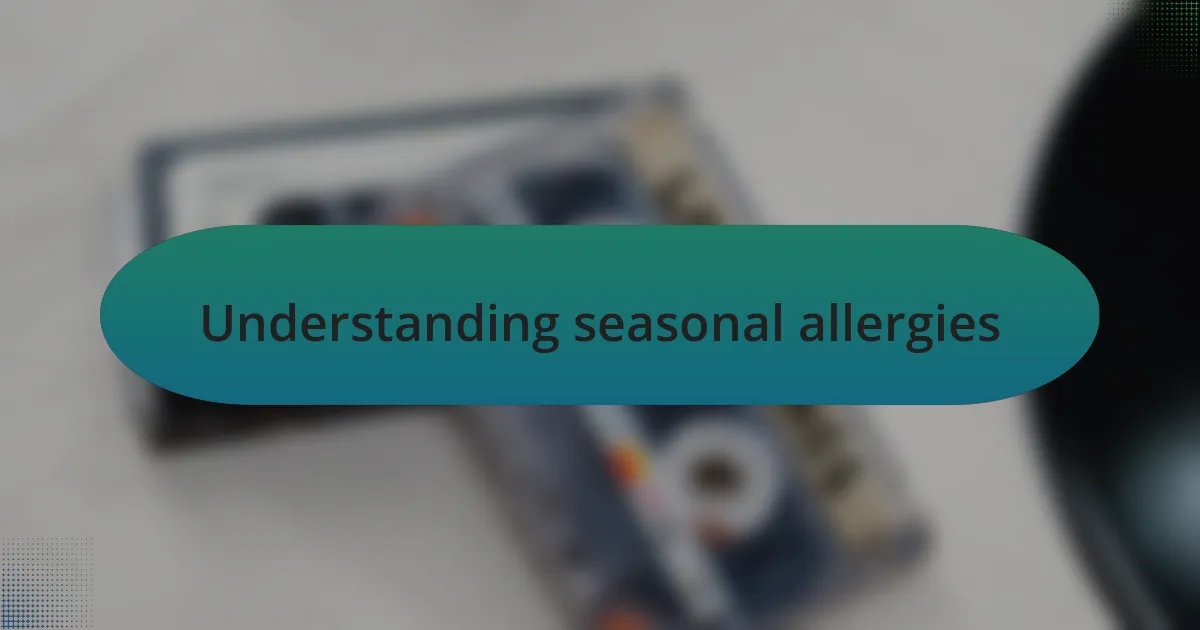
Understanding seasonal allergies
Seasonal allergies are a common affliction affecting millions as certain plants release pollen during specific times of the year. I remember the first time I stepped outside in spring, only to be met with sneezing fits and itchy eyes—the world seemed so vibrant yet so unbearable. It’s interesting to think: why is it that something as essential as flowers can cause such distress?
The response to seasonal allergens like pollen involves the immune system mistakenly identifying harmless substances as threats. This overreaction triggers a cascade of symptoms, which can range from mild inconvenience to significant disruption in daily life. I often wonder about the paradox of enjoying nature while simultaneously dreading the discomfort it can bring, especially when the sun shines bright and the air smells fresh.
Emotional responses to seasonal allergies can run deep, often affecting not just physical well-being but also mood and social interactions. I’ve felt the frustration of passing on outdoor gatherings because my allergies were flaring up; it’s disheartening when something as simple as enjoying a picnic becomes a chore. Have you experienced that tug-of-war between wanting to be outside and battling the effects of pollen? It’s a constant balancing act many of us navigate.
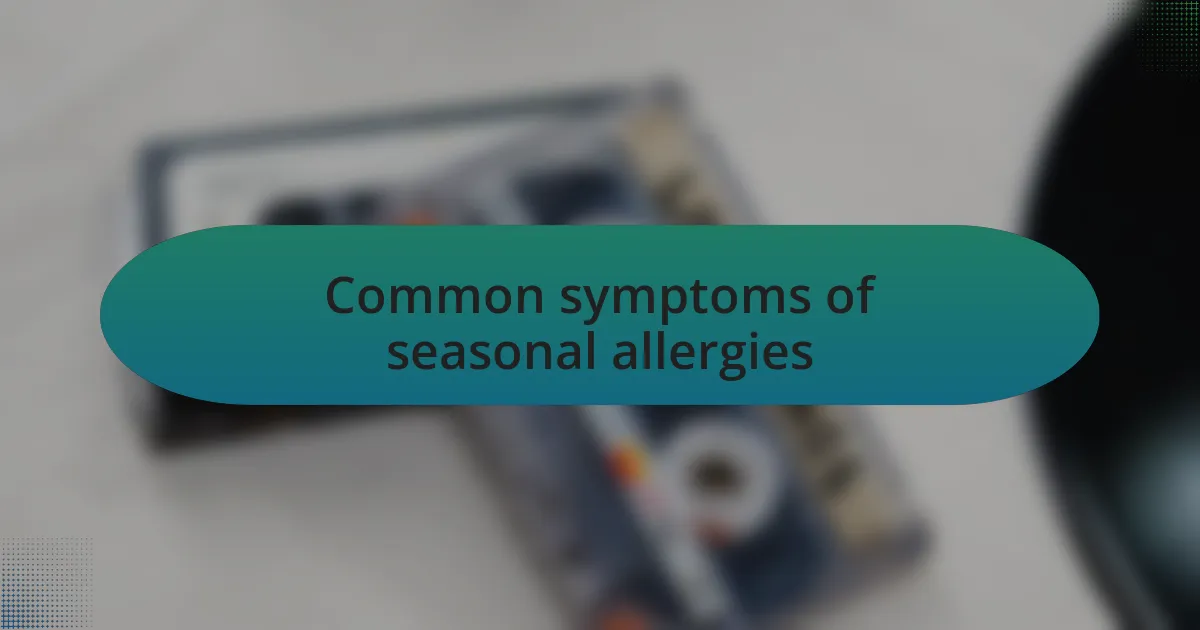
Common symptoms of seasonal allergies
Common symptoms of seasonal allergies can really affect how I experience the changing seasons. I remember a particularly vivid spring when my nose felt like it had a mind of its own, constantly running and requiring me to reach for tissues. It’s amazing how something seemingly harmless, like pollen in the air, can lead to a symphony of sneezing, nasal congestion, and itchy eyes—it often feels overwhelming.
As the days grew warmer and the flowers began to bloom, my body waged war against the allergens. Sometimes, I find it perplexing how one moment I can be basking in the sunshine, and the next, my eyes are red and swollen, making it hard to see clearly. Hasn’t it ever felt incredible, yet frustrating, to enjoy nature while battling these symptoms? It’s a strangely human condition, being so connected to our environment yet so affected by it.
Sometimes, I catch myself feeling drained not just physically but mentally, as fatigue often follows a long bout of allergy symptoms. On days when I struggle to breathe freely, the simple act of walking outdoors becomes a real challenge. It’s essential to recognize that these symptoms can vary significantly; have you ever been caught unaware by how they can shift from mild irritation to downright debilitating? Understanding this can help us brace ourselves for the beauty of the seasons ahead, even when they come with a few surprises.
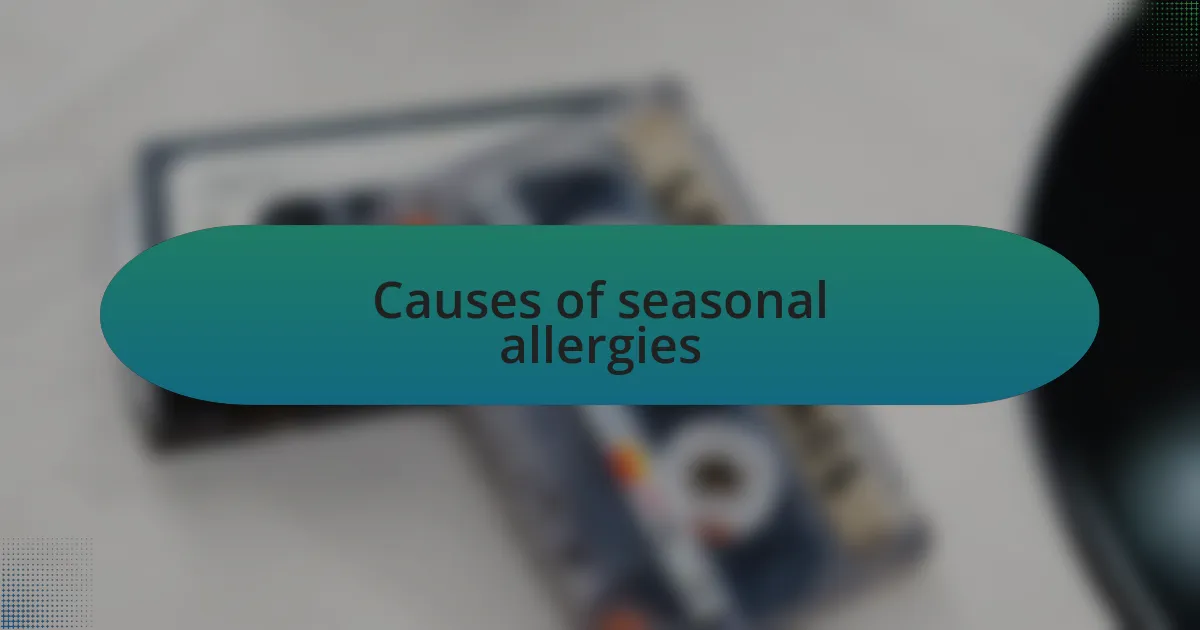
Causes of seasonal allergies
Pollen is perhaps the most notorious culprit behind seasonal allergies, especially during spring and fall. I can vividly recall a time when the cherry blossoms were in full bloom, and I felt like I was stuck in a sneeze-loop. Just stepping outside would send me into a frenzy, wondering how something so beautiful could cause so much discomfort. Isn’t it ironic how nature can both uplift and challenge us?
Mold spores also play a significant role in triggering allergies, especially during the damp months of late summer and early fall. I remember spending a weekend in an old cabin, blissfully unaware that the mold lurking in the corners would turn my weekend getaway into an endless cycle of sinus pressure. It’s fascinating, isn’t it, how a damp environment can unleash such discomfort? Many people underestimate mold’s impact, but for those like me who are sensitive, it can feel like an unwelcome guest.
Interestingly, ragweed is another major offender, affecting millions of people when it releases its pollen into the wind. I’ve experienced the shift when summer transitions into fall, and suddenly, I’m grappling with a runny nose and itchy throat after just a short stroll outdoors. Have you ever noticed how such a simple change in the environment can leave you feeling vulnerable? Recognizing these shifting triggers has been pivotal in how I manage my allergy symptoms, helping me prepare and lessen their impact.
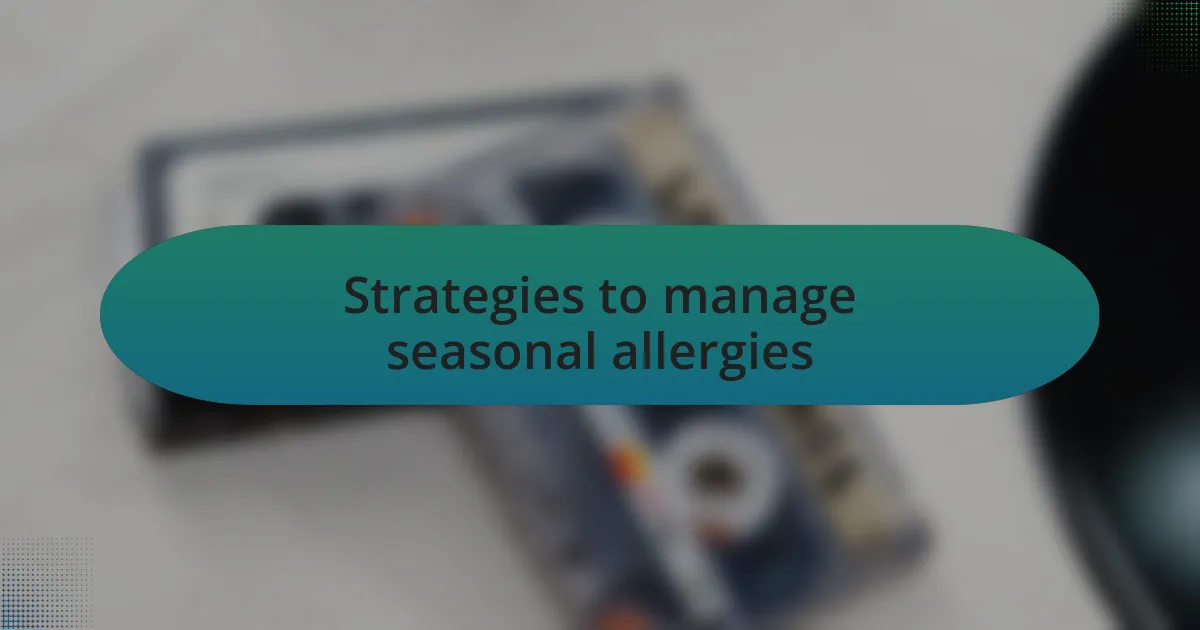
Strategies to manage seasonal allergies
When it comes to managing seasonal allergies, I’ve found that preparation is key. I always check the pollen forecast before planning outdoor activities. There’s something reassuring about knowing when I can enjoy a sunny day without being ambushed by sneezing fits. Have you ever had to cancel a perfectly planned picnic just because you underestimated the pollen count?
Another strategy that has worked wonders for me is creating a clean indoor environment. Regularly changing air filters in my home has reduced allergens significantly. Once, during a particularly rough allergy season, I invested in a high-efficiency particulate air (HEPA) filter. The difference in air quality was almost immediate, which made me wonder how I had lived without it before. A small change can sometimes yield surprisingly substantial results.
I also tend to stick to allergy medications as a proactive approach rather than waiting for symptoms to hit. I remember one autumn when I thought I could tough it out. The result? Endless days of discomfort. Now, I take antihistamines when I know pollen levels are high, and it’s like having an invisible shield against the chaos that comes with allergies. Isn’t it amazing how a proactive mindset can change your experience entirely?

Using an audio news aggregator
Using an audio news aggregator has transformed how I stay informed, especially during allergy season. I remember the days when I relied solely on written articles, which often felt overwhelming and left me skimming over important points. With an audio aggregator, I can listen to the latest updates on allergy forecasts or new treatments while I’m cooking or relaxing at home, making multitasking a convenient part of my routine.
One feature that I truly appreciate is the ability to customize my feed. I focus on health and environmental news, ensuring that the content I receive is relevant and timely. There’s something empowering about tuning into reports that speak directly to my concerns without having to wade through irrelevant articles. Have you ever thought about how much time you could save if your news was tailored just for you?
Engaging with audio content has also made news consumption feel more personal and interactive. I often find myself reflecting on different perspectives from various hosts, which enriches my understanding of how allergies affect others in my community. It’s fascinating to hear stories that resonate with my experiences—whether it’s dealing with pollen-induced headaches or tips for managing symptoms while still enjoying the outdoors. Isn’t it comforting to know that we’re not alone in this struggle?
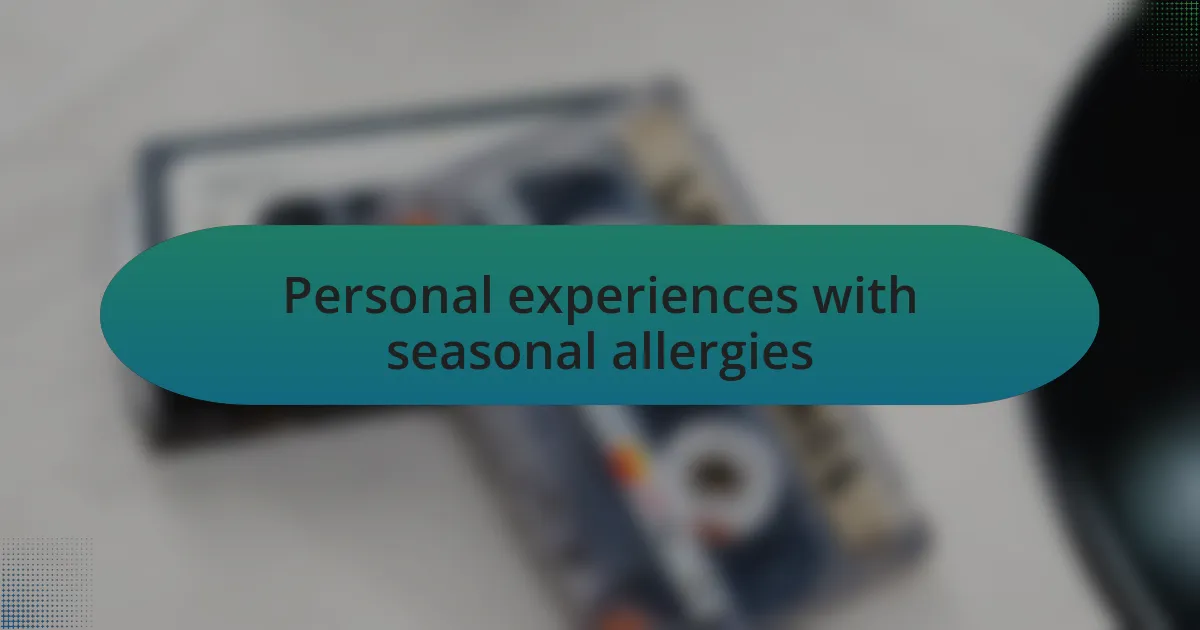
Personal experiences with seasonal allergies
Living with seasonal allergies has often felt like navigating a minefield. I can vividly recall a spring day when I stepped outside, eagerly anticipating the blooms, only to be struck by a wave of sneezing and itchy eyes. Do you know that feeling when you want to enjoy the outdoors but your body seems to rebel against you? It was a bitter reminder of the challenges that come with the beauty of nature.
I’ve found that keeping tabs on pollen levels through audio news updates has significantly eased my anxiety during peak seasons. One memorable moment was last year when I learned, via a podcast, that certain plants were especially high in allergens. Armed with this knowledge, I was able to plan my outdoor activities around allergy forecasts, which made a noticeable difference in my comfort level. Have you ever felt a sense of relief from simply being prepared?
Sometimes, I experience an emotional rollercoaster when battling seasonal allergies. On one hand, there are the moments of sheer frustration that build throughout the season; on the other, there’s the triumph of learning to manage my symptoms better. Just last week, after a particularly tough day, I discovered a new technique through a podcast—using a saline nasal rinse—that has since turned my evenings around. What methods have you discovered that help you regain control during allergy season?